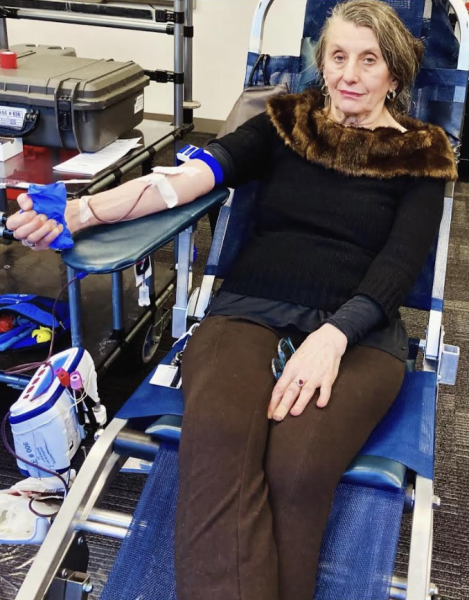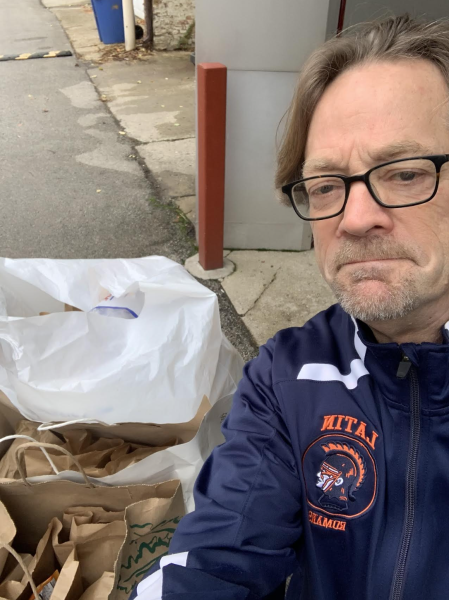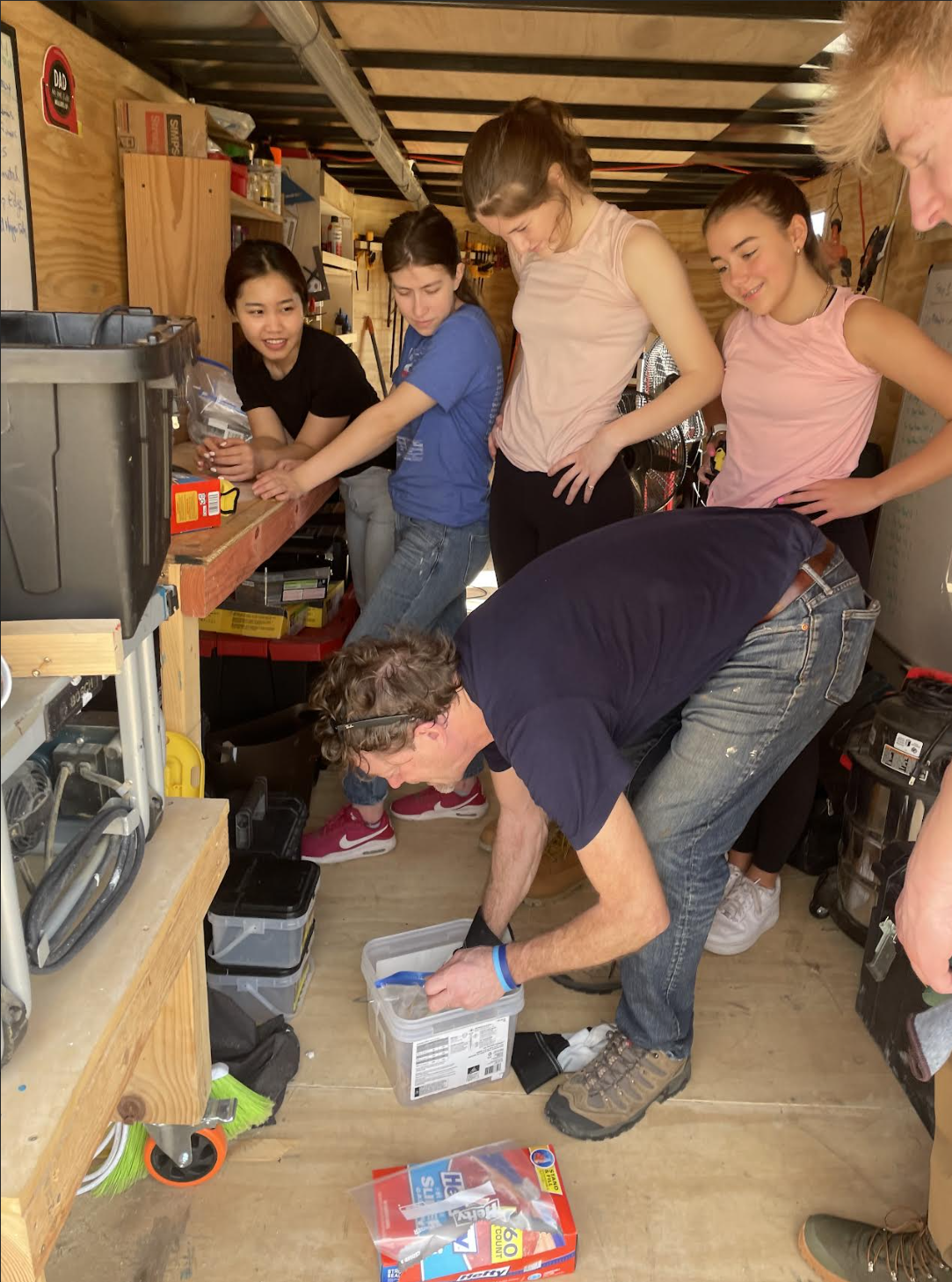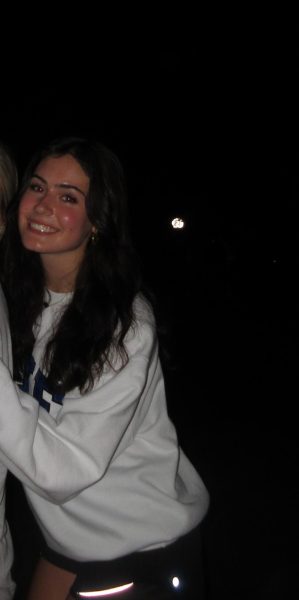Twice a year, Latin comes together to host Vitalant’s blood drive, donating to impact lives and become a source of hope for those in need. For Director of Student Life Tim Cronister, the blood drive is a charitable legacy and an important part of his 26 years at Latin.
Blood drives are increasingly important to lives across the globe: Just one person’s blood can save the lives of three people. Latin hosts two blood drives each year and partners with Vitalant to conduct a safe and organized drive so the whole school can participate.
The need for blood has been particularly keen since the AIDS crisis. Historically, many blood drive organizations have not allowed gay men to donate blood to reduce the risk of transmitting HIV or AIDS. Perceptions of the disease have shifted, and many blood donation services are changing their policies to reflect this change.
“We switched companies from Red Cross to Vitalant, [due to] laws that were being passed that were inclusive and not inclusive with LGBTQ+ communities,” Mr. Cronister said.
Each year, many Upper School students donate blood.
Senior Paul Silvani participated in the blood drive. “It’s a pretty easy way to get some community service hours,” he said, “I was probably out in like 35 minutes.”

Organizing a blood drive is not an easy task. Preparation starts months in advance with a multitude of factors coming into play.
“In the summer I [contacted Vitalant] to try to pick some dates,” Mr. Cronister said. “I always try to pick a time when sports seasons are ending, to get more athletes.” After that, Mr. Cronister works with the Parent Association and Communications Office to expand his outreach.
Donors must be 16 or older to donate blood, so the fall blood drive often attracts fewer donors than the spring.
“Thirty-four [people] is pretty good for the fall,” Mr. Cronister said. “I felt really good, and people really stepped up. That’s what I really liked.”
Mr. Cronister’s passion for service stems from his childhood upbringing. “I went to a Quaker school, and I went to a Quaker college,” he said. “Quakers believe a lot in service.”
Mr. Cronister has dedicated much of his life to community service and brings these values to his work every day.
“I think, at Latin, the importance is trying to teach kids empathy,” Mr. Cronister said. “We follow a lot of guidelines of awareness, action, and empathy. It’s important to explain to kids why we are doing things. It doesn’t matter if you’re rich or poor, you want to take advantage of helping.”
In an effort to increase Latin’s community service involvement, Mr. Cronister believes in gradual advances.“I am not so much of a person to exactly mandate. I am a person who pulls things from people instead of telling them,” he said.
Sophomore Charlotte Flandina has worked closely with Mr. Cronister for years. “I’ve known Mr. Cronister since I was 4, and he and I have maintained a good relationship because I’ve always been involved with community service at Latin,” she said.
Charlotte’s experience working with Mr. Cronister is a direct example of Mr. Cronister’s deep commitment to service learning, “When I did tutoring at McCutcheon tutoring through Latin, and was the only Middle Schooler there, Mr. Cronister helped me feel safe with all of the high schoolers and [helped] navigate me through community service,” she said.
Charlotte’s experience shows how community service goes beyond helping others—it also fosters meaningful connections and relationships within the community.

Mr Cronister said, “The partnerships that you build over the years is really important, from the Chicago Park District to some of our partners in Uptown, like the Uptown Baptist Soup Kitchen.”
Within the Latin community, Mr. Cronister is proud of the initiative students have taken in their engagement. He recalled what he saw while reviewing the service hours forms, noting, “I get most excited when I see students getting active and getting involved themselves.”
Getting involved with the service opportunities, freshman Bo McCrea, a new addition to the Latin student body, conveyed the importance of the blood drive. “The blood drive has a huge impact, not just on Latin, but on the city of Chicago, too,” he said. “Even though I haven’t talked to Mr. Cronister much, it’s clear how much he cares. I always see his weekly emails, and I feel like there are always so many opportunities.”
Mr. Cronister’s dedication to community service extends beyond the blood drives. This year, he has implemented new strategies to engage more students in service learning.
All Upper School students are now required to complete eight hours of service. “Sophomores used to have 20 hours and freshmen had 10,” he said. “I’ve been slowly trying to get that back up.”
Mr. Cronister believes it is integral to find a passion through community service. “You gotta find something that you love,” he said. “Try something new … that is part of the thing I want people to change. I encourage you to find five or six things freshman and sophomore year. Junior and senior year, however, work more closely with what you love most.”
Encouraging the Upper School students to explore diverse opportunities, Mr. Cronister is eager to reintegrate service learning into the Latin curriculum. He often reminisces about the days when biology classes would work with the city to combat pollution levels in the Chicago River.
“My vision is to be able to expand service learning,” he said.
Mr. Cronister shared valuable advice to students aiming to maintain their involvement in service learning. “Whenever I get bent out of shape, I move on and change my perspective,” he said. “I think that knowing that someone might not have as much or is going through a more difficult situation is really important.”











